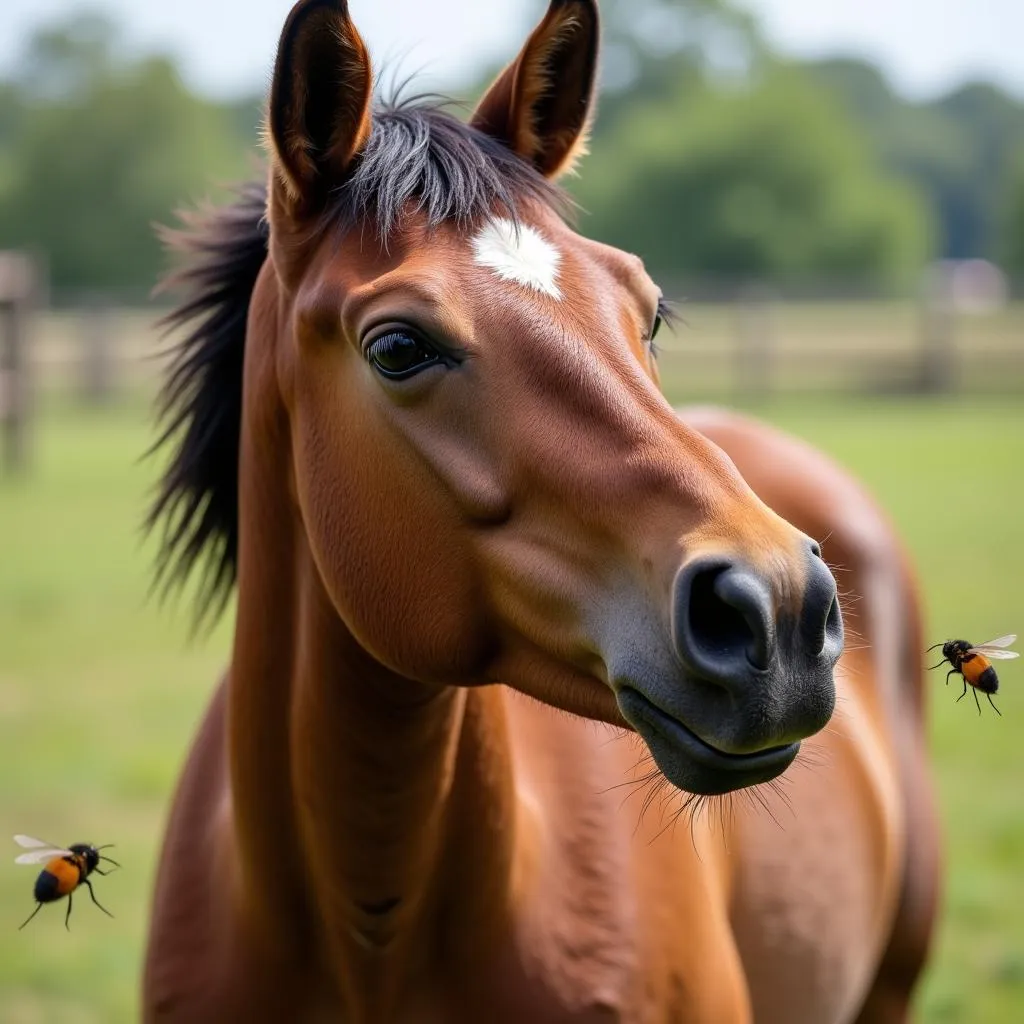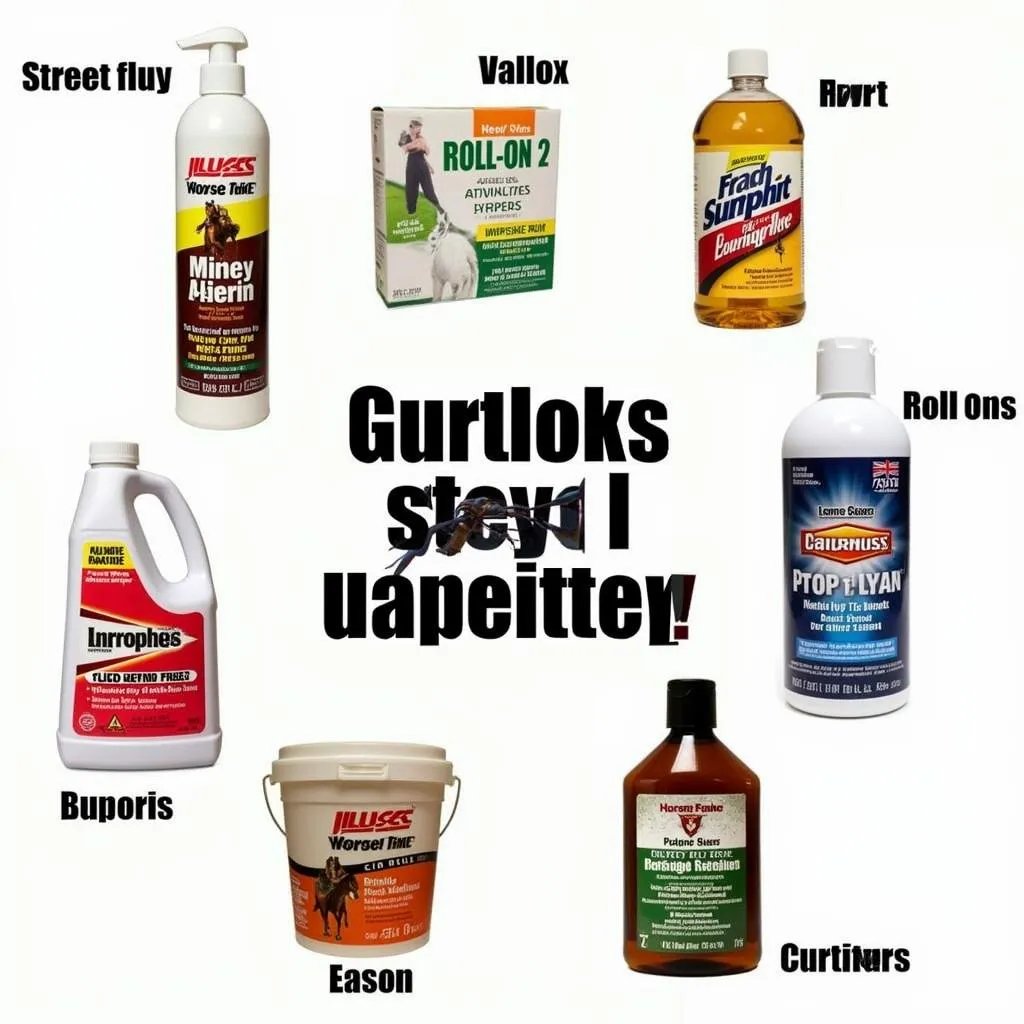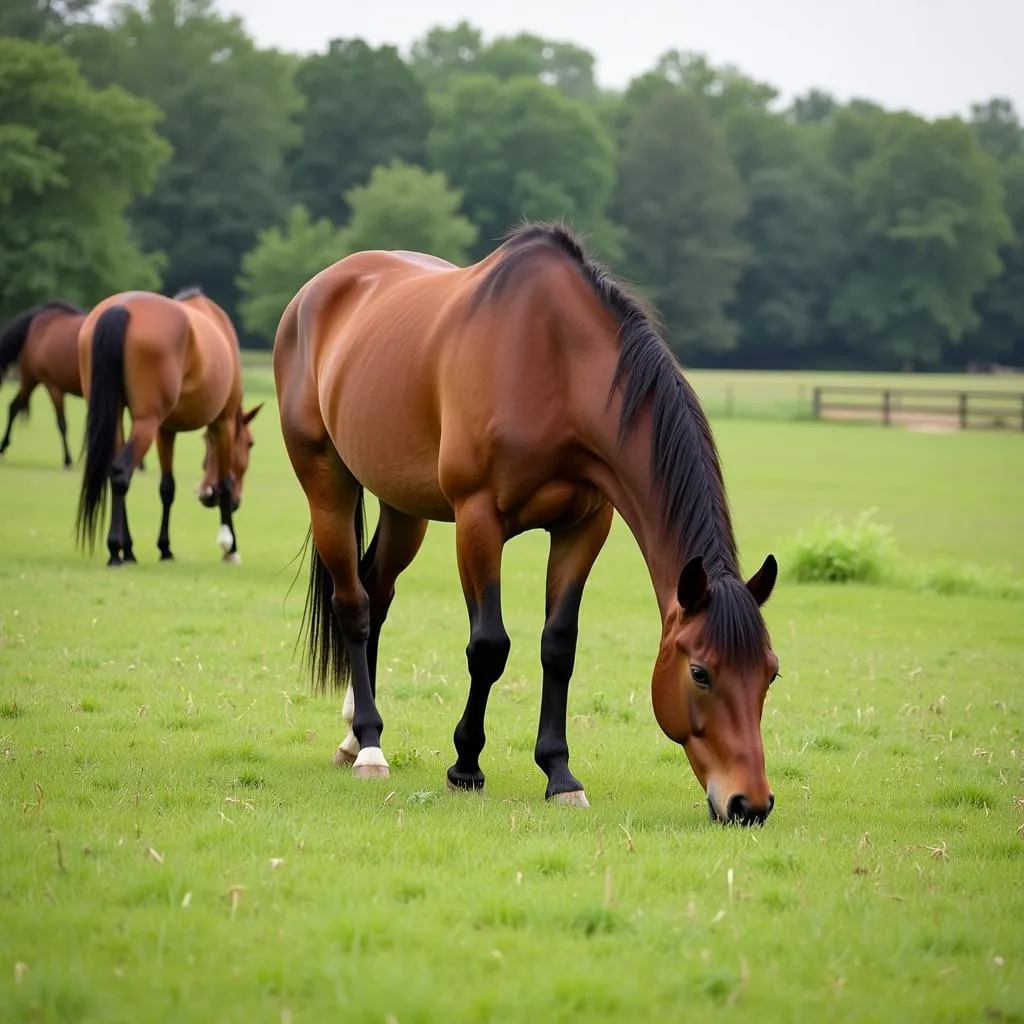As horse owners, we want to provide the best possible care for our equine companions, ensuring their comfort and well-being. One aspect of horse care that requires attention, especially during warmer months, is protection from pesky flies and mosquitoes. These biting insects are not just a nuisance; they can cause significant discomfort, transmit diseases, and even lead to allergic reactions in horses. Choosing the right fly and mosquito repellent is crucial to keep your horse comfortable and protected.
 Horse visibly annoyed by flies, trying to swat them away
Horse visibly annoyed by flies, trying to swat them away
Understanding the Fly and Mosquito Menace
Before delving into repellents, it’s important to understand why these insects are so bothersome to horses. Flies, including horseflies, deer flies, stable flies, and house flies, are attracted to moisture, odor, and body heat. They can inflict painful bites, leading to irritation, wounds, and infections. Mosquitoes, on the other hand, are notorious for their itchy bites and their ability to transmit diseases like West Nile Virus and Eastern Equine Encephalitis (EEE).
Horses are particularly vulnerable to these insects due to their large size and the fact that they cannot easily swat them away from certain areas like their faces and legs.
Types of Fly and Mosquito Repellents for Horses
A wide variety of fly and mosquito repellents are available for horses, each with its own pros and cons. Choosing the right one depends on your horse’s individual needs, your budget, and your personal preferences. Here are some common types:
- Sprays: Fly sprays are a popular choice due to their ease of application. They typically contain pyrethrins, permethrins, or other insecticides that kill or repel insects.
- Roll-ons and Gels: These offer a more targeted application and are often used around sensitive areas like the eyes and muzzle.
- Wipes: Convenient for quick touch-ups and for use on the face, wipes are pre-soaked in repellent solution.
- Pour-ons: Long-lasting and often waterproof, pour-ons are applied along the horse’s backline and spread through the coat.
- Feed-Through Supplements: These supplements work from the inside out, making the horse less attractive to biting insects.
 Various types of fly repellent for horses on display: sprays, roll-ons, and pour-ons.
Various types of fly repellent for horses on display: sprays, roll-ons, and pour-ons.
Factors to Consider When Choosing a Repellent
- Ingredients: Look for repellents that contain effective yet horse-safe insecticides. Avoid products with ingredients that your horse may be allergic to.
- Duration of Effectiveness: Repellents vary in how long they last. Some may need to be reapplied multiple times a day, while others provide protection for several days.
- Water Resistance: If your horse sweats a lot or enjoys splashing in water, choose a water-resistant or sweat-resistant formula.
- Application Method: Select a product that you find easy to apply and that suits your horse’s temperament.
- Scent: Some repellents have strong odors that may be unpleasant for both you and your horse.
Natural Fly and Mosquito Repellent Options
For horse owners seeking natural alternatives to chemical insecticides, several options are available:
- Essential Oils: Certain essential oils, such as citronella, lemongrass, eucalyptus, and tea tree oil, have insect-repelling properties.
- Apple Cider Vinegar: Adding apple cider vinegar to your horse’s feed or water is believed to make them less appealing to biting insects.
- Garlic: Similar to apple cider vinegar, incorporating garlic into your horse’s diet may help deter flies and mosquitoes.
“When using essential oils, always dilute them properly and consult with your veterinarian for safe usage guidelines,” advises Dr. Emily Carter, a renowned equine veterinarian.
 A horse grazing peacefully in a field, free from fly annoyance.
A horse grazing peacefully in a field, free from fly annoyance.
Tips for Effective Fly and Mosquito Control
- Keep a Clean Stable Environment: Regularly remove manure, soiled bedding, and standing water to minimize breeding grounds for insects.
- Provide Adequate Ventilation: Good airflow in the stable helps to deter flying insects.
- Use Fly Masks and Sheets: Protect your horse’s face and body with fly masks and sheets, especially during peak insect hours.
- Schedule Outdoor Activities Strategically: Avoid turning your horse out during peak fly and mosquito activity, usually dawn and dusk.
By following these tips and choosing the right fly and mosquito repellent, you can help your horse enjoy a comfortable and insect-free summer.
FAQs about Fly and Mosquito Repellent for Horses:
Q: Can I use human insect repellent on my horse?
A: No, human insect repellents often contain DEET, which is toxic to horses. Always use products specifically formulated for equine use.
Q: How often should I apply fly spray to my horse?
A: The frequency of application varies depending on the product. Always follow the manufacturer’s instructions.
Q: What should I do if my horse has an allergic reaction to a fly repellent?
A: Stop using the product immediately and contact your veterinarian.
Need More Help?
For personalized advice on choosing the right fly and mosquito repellent for your horse, contact Justus Horses USA today! Call us at 0772127271, email us at [email protected], or visit our location at QGM2+WX2, Vị Trung, Vị Thuỷ, Hậu Giang, Việt Nam. We offer 24/7 customer support.